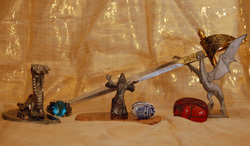Musing on Magical Items
So, how much is too much when it comes to magical items?

Swords, Scarabs, Dragons, and Rings
Over the last few years, I’ve encountered a real resistance among some readers, writers, and editors of Fantasy fiction to novels that include magical swords, amulets, rings, and the like. These works are spoken of with a sneer and are much less likely to get attention when the time comes for award nominations. Oddly, this resistance includes “fan” awards, even when the books in question are topping the bestseller lists.
As for dragons… I’ve been on panels where panelists have proudly and loudly announced that their forthcoming Fantasy novel is a “dragon-free” zone.
But I wander off my point. (But then, these are Wanderings, right?)
So, where did this resistance to magical items come from? Why has the idea arisen that the inclusion of such makes a piece less magical?
Certainly magical items belong to Fantasy from its earliest roots in mythology. Many of the Norse gods possessed magical items. Some had more than one. Thor, for example, not only had his hammer Mjolnir, but also an iron mitten that let him catch the hammer when he threw it at a target. (The hammer apparently had boomerang properties). Thor also had a magical belt that increased his strength two-fold. Oh, yeah, let’s not forget his war cart, which was drawn by billy-goats and flew through the air.
Greek myths also contain magical items. These are not limited to those like the Chariot of the Sun, which can be “excused” as a pseudo-scientific explanation for natural phenomena. Nor are they restricted to divinities. Mortal heroes often bear magical weapons. Perseus is equipped with not only Athena’s mirror-bright shield, but with Hermes’ own magical sword. As if this is not enough, the nymphs of the north loan him magical sandals that let him fly, a cap that makes him invisible, and a bag that swells to contain whatever is put into it,( so he’ll have a neat and tidy place to store Medusa’s head).
I could go on and on… There are magical harps of the British Isles. The amulets and charms of the Egyptians. The magical armor and weapons with which almost every culture equips its gods and heroes. Sometimes, the ability to use these items is taken as proof that the bearer is, in fact, worthy to be a hero.
So, again I ask, why are such so often scorned when they appear in Fantasy fiction? Why does giving the protagonist a magical sword immediately slide the tale down the literary scale?
Over the last week or so, inspired by Alan and my discussion of Fantasy fiction that draws from Welsh sources (TT 5-02-13), I’ve been re-reading Lloyd Alexander’s Prydain Chronicles. (The first book is The Book of Three, if you’re interested in trying them.) Here we have a magical sword, a glowing sphere, and a magical harp… There are magical tomes, potions and lotions, and a very potent amulet. Indeed, the only item in the magical bag of tricks that is missing is a ring.
Despite this, I have heard the books praised by the hardest of the hard-headed as really good Fantasy fiction. Nor do I think that the Prydain Chronicles “get away” with including magical items because they are “children’s books.” In fact, as an avid reader of YA fiction, lately I’ve encountered more – not less – aversion to novels that include magical items. Yes. Even though Harry Potter included a host of such, the resistance is there.
I could go on and on, but I’ll pause and give you a chance to get a word in. Do you have a particular favorite among the magical items of Fantasy fiction? When do you think enough is enough? Does the inclusion of magical items – especially those classic swords and rings and suchlike – cause you to hesitate to even give the story a try?





